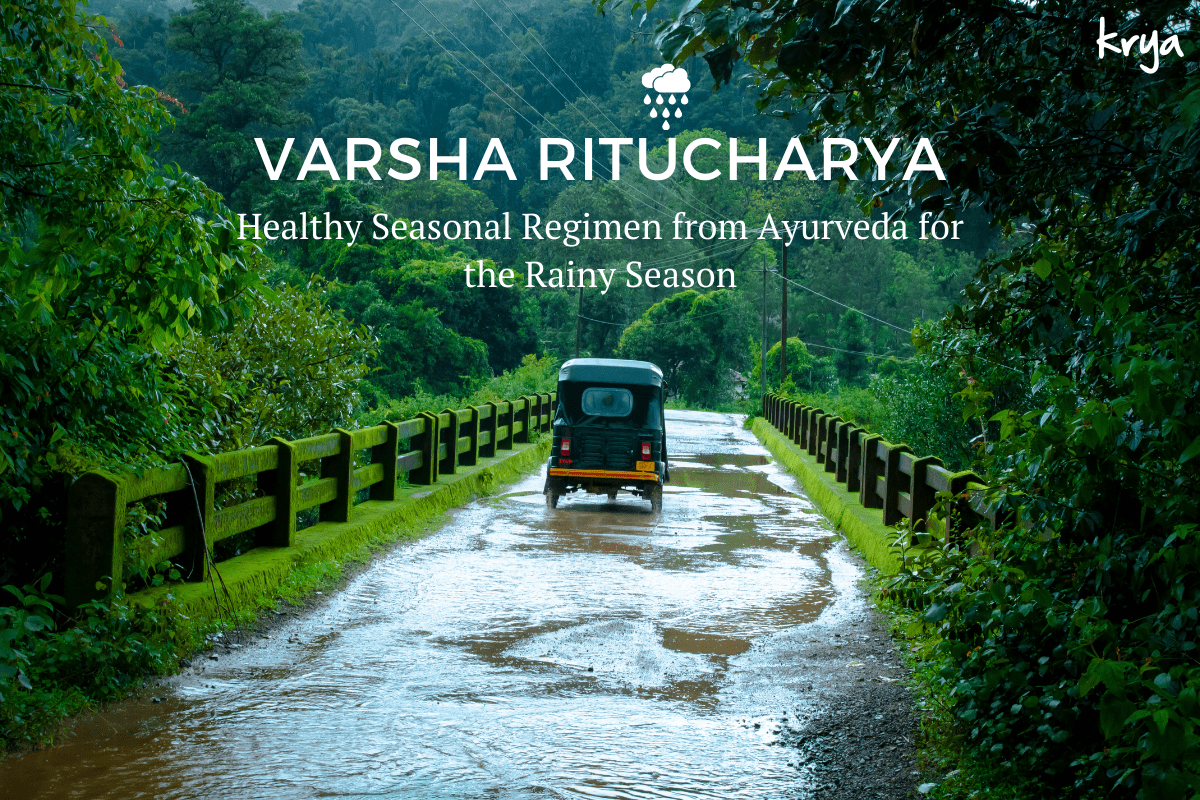This post was last updated on August 14, 2023 by Preethi Sukumaran
It is raining in many parts of India, and this season is called the Indian Monsoon or Varsha Ritu . Can we eat fried food this season? How much should we exercise? How should we modify our Dinacharya?
The answers to these questions come from Ritucharya or seasonal living guidelines. Ayurveda advises us to follow seasonal living guidelines or Ritucharya for good health.
The Seasonal guidelines or Ritucharya help us modify our Dinacharya or daily living guidelines depending upon the effect of the season and the sun’s rotation around the earth. These 2 factors have an effect on our energy levels, the natural ups and downs of Vata, Pitta and Kapha in the body, and our capacity to digest food. Obviously, the availability of grains, vegetables, meat etc. also changes by season. So when we eat appropriately, follow the correct seasonal lifestyle, exercise routine and pay attention to the natural dosha imbalances in our body and treat them appropriately, we enjoy better health and energy levels.
So what are the seasonal living guidelines in Monsoon or Varsha Ritucharya?
The movement of the Sun according to Ayurveda
Shishira (late Winter), Vasantha (Spring) and Greeshma (Summer) are the 3 seasons that fall in the Uttarayana period, when the Sun is seen to move in a Northern direction. The Acharyas term this period, “Adana kala”. Adana kala means “time phase / period” of “extraction/lessening”. During Uttarayana, the earth has less moisture content and the air is drier. All these changes affect the health and strength of all living organisms – so Adana kala is considered a period when “strength is decreased or taken away”.

In all seasons which occur in Adana Kala, there is a loss of strength, less moisture, and overall dryness. Any season which occurs just after Adana Kala, continues to experience some of these effects.
Need for Ritucharya : Seasonal changes in Varsha Ritu according to Ayurveda
Varsha (Monsoon) Ritu (season) falls immediately after Greeshma. In Greeshma, as we have seen above, there is already a decrease in strength and vitality due to the phenomenon of Adana Kala.
When this weakened strength meets the rain and humidity seen in Varsha, the body is further weakened. As rain hits the earth, the heat stored in the previous season releases as vapor and humidity. Summer has a high concentration of pitta energy which is acidic, salty and spicy. So there is a natural increase in acidity in the soil during summer. When this acidic earth is hit by water in Varsha, the vapor that is released during monsoon, is also acidic in nature.
Why is healthy seasonal regimen important to follow?
The combination of amlavipaka (sourness) vapor rising from the earth, the already weakened state of the body due to Adana kala that just got over, and presence of rain and wind, all work to decrease body strength and vitiate all 3 doshas. Vata dosha is highly aggravated in Varsha Ritu. Pitta Dosha is unsteady and is slowly getting aggravated – it reaches its aggravation peak in the next season of Sharad Ritu. When 2 doshas are out of sync, naturally the third dosha, Kapha, will also be imbalanced.

Hence we must be very careful in Varsha Ritu not to upset digestion or vitiate the body further through our activities.
For those where there is already high vitiation, Varsha Ritu is considered a good time for panchakarma treatment to rebalance all 3 doshas. Specifically, vasti treatments (enema) to balance aggravated Vata is best carried out in this season. All good Ayurvedic clinics will choose this season for panchakarma treatments to reset your doshas.
What are the consequences of Dosha imbalance in Monsoon season?
Vata dosha undergoes high aggravation in Varsha Ritu. Pitta dosha undergoes sanchaya (mild accumulation) in this season only to get aggravated in the next season, Sharad / Autumn.
Agni / Digestive fire is severely impaired in this season. So all of us suffer from Mandagni – impaired / depleted Agni. Therefore, as a part of Varsha Ritucharya, all of us must exercise precautions and should not overload the digestive system in this season. Do NOT succumb to poor nutritional advice and eat a lot of fried food, etc. (chai+pakodas) in this season!
What are the issues we face if we do not tweak our Daily routine to suit the monsoon?

- Bone and joint aches. Conditions like spondylitis, lower back pain, etc. can aggravate if untended to
- Insomnia / mental anxiety / up and down moods/depression
- Hair goes dry; split ends develop
- Skin lacks luster, feels dry
- Digestion is impaired; Constipation could arise
- If heavy / unsuitable food is taken energy drops, body feels heavy, there is lassitude and lack of energy and Ama production could occur
- Poor / impaired appetite; slow digestion; Piles / Hemorrhoids can occur in those prone to it
Ayurvedic Regimen for Diet & Lifestyle in Varsha Ritu
The food regimen in Varsha Ritu is designed to specifically compensate for the poor strength and impaired digestive fire in this season. Therefore, the choice of grains, selection of spices, vegetables, and meats and preparation methods are all designed to help digestion.
Aged cereals and pulses are considered best for Varsha Ritu as this is easy to digest by the body. Aged rice (Shali), aged Godhuma (wheat) and Yava (Barley) are excellent grains in monsoon.
This is not the season to eat brown rice or rice with the husk intact, millets and other hard to digest grains. Semi polished white / semi white rice is a better choice or Wheat, if we are used to it. Please make a special effort to include Yava (barley). This is excellent to remove excess water in the body which accumulates in Varsha.

Instead of fatty meat, the texts recommend eating Rasa (Meat soup) of Jangala Mamsa (animals found in dry and arid places). In modern times we find this difficult to source. So, if eating meat, we must only choose lean meat soup preparations in this season. Rasa is easy to digest according to Ayurveda and gives strength.
Culturally in months like Shravan /Karkidam / Aadi, we have always had restrictions on Meat consumption for religious reasons. This is one way how Santana Dharma, Culture and Ayurveda intermingle and co-exist in India. So when in doubt, it is good idea to follow the food traditions prevalent in your family / geographical region.
Lentil Soups or Yusha, which are well cooked, liquid and easy to digest, are also recommended in this season. Yusha (soup) made from green gram is particularly recommended.
Digestive and vata controlling spices like Sunthi (dried ginger), Pippali (in small amounts), Maricha (pepper) and Jiraka (Jeera) are recommended to be used in food. Saindhava Lavana and Curry leaf can also be used in this season.
Curd is not advised in most seasons in Ayurveda. It is definitely not advised in rainy season when digestive strength is poor. Instead, we are asked to take Mastu (Supernatant fluid of home set curd). IF you have home set curd, you can take the watery part that separates above as Mastu OR You can instead have well churned buttermilk that is heavily diluted (1-part curd: 5 parts of water, churned and butter extracted).
To help even this Mastu digest properly, the texts advising seasoning with very small amounts of Sanchal namak / Kala namak – this variety of salt is very teekshna and sookshma and highly digestive. But it should not be had indiscriminately as it can aggravate Pitta dosha
Local, seasonal vegetables, preferably organic, which is washed well. Shaka (vegetables) are considered difficult to digest in Ayurveda. Hence in rainy season where digestive strength is poor, make sure vegetables well cooked, with both water and sneha (fats) to ensure that it is easy to digest. Avoid / Reduce difficult-to-digest vegetables and their preparations like raw vegetables, sprouts, and greens.
Hard vegetables like potatoes, carrots, beans, pumpkin, etc. must be par boiled in clean water and water must be discarded before cooking. This reduces their hard, vata aggravating nature.
Vegetable soups are considered harder to digest compared to Yusha (green gram soup) as per Ayurveda.
Please avoid having raw food / salads in this weather as it is guru (heavy to digest) and can paradoxically decrease immunity. Similarly, heavy to digest foods like sweets, desserts, ice-creams, should be avoided. Churned Drinks (Mantha) like Sattu, Sweet LAssi & watery liquids like fruit juices, etc. must also be avoided in this season.
Cold, stale food is guru (heavy to digest). As Agni is impaired in this season, eating stale food can cause heaviness, lack of energy and Ama buildup in this season.
Preparing water to stay healthy in Varsha Ritu
Water, even from a clean source has the tendency to get polluted in Varsha Ritu. Additionally, Water, being high in Jala (water) and Prithvi (earth element), is cold, difficult to digest and still. The Ayurvedic texts recommend preparing water, by boiling it with appropriate herbs in all seasons for better physical and mental health. This advice becomes even more important in Varsha Ritucharya in ayurveda , as digestive fire is poor and vata aggravation is high.
Hence, in this season, it is advisable to drink well boiled luke warm water.
How much should we boil the water? Here are some prakriti-wise suggestions:
- Kapha dominant prakriti should boil drinking water until it reduces to QUARTER its original volume.
- Pitta Dominant prakritis can boil water until it reduces to HALF its original quantity
- Vata Dominant prakritis can boil water until it reduces to THREE QUARTERS its original volume
- If you are preparing water for the entire household, please boil water until it reduces to half or a little less than half. This process usually takes around 20 minutes for 5 liters of water.

Water reduction by boiling is especially suitable in Varsha Ritu due to excessive water in the body. If you are Pitta prakriti, wait until water has cooled slightly before drinking. Drink boiled and cooled water on the same day itself – do not store overnight.
Special diet instructions for a day with torrential rain with very little / no sunlight:
On a day with torrential rain with little to no sunlight, the already dampened digestive fire becomes even more week in Monsoon. Therefore, our diet must compensate for this dampened digestive fire. It is therefore advisable to eat fresh, noticeably sour and salty food as it stimulates Pitta dosha to aid digestion. This should be eaten with Sneha dravyas (fatty substances) like ghee added to improve digestion.
Foods on such days must be slightly drier than normal preparations and should be light and easy to digest – this helps maintain the health of you and your family.
E.g.: a simple dal cooked with traditional souring agents like amchur / kokum / tamarind, made with ghee and spices, a seasonal vegetable well cooked, and aged rice is considered a good dish. If sunshine is weak and rain is very heavy, you may add an amla pickle to this meal.
Dinacharya modification in Varsha Ritu:
Abhyanga modifications in the rainy season
Avoid abhyanga/head oiling on a day where there is extremely heavy torrential rain / no sunlight, or when you have gotten drenched in the rain
For days with milder rain, Abhyanga may be continued with a few precautions.
Always use warmed Abhyanga oil during Varsha Ritu. Oil quantity used must be slightly less than normal. The Abhyanga itself should be very brisk and strong. We are asked to use a limb squeezing technique, though not as hard as we would in Winter. The reason for these precautions is to both avoid Kapha buildup in body and to also deeply penetrate and balance aggravated Vata.
Soak in a warm room – do not allow the body to go cold or clammy. If you live in a very monsoon heavy area, avoid the soak completely. Instead, focus on doing the Abhyanga in a brisk and strong manner to ensure deeper & better oil penetration. Use a warming Abhyanga Oil like the Intense Abhyanga oil.

Have a Snana / bath with hot water, neck downwards. Ensure oil on body is completely removed during bath on Abhyanga days. If you live in an area with high rain or are prone to Kapha imbalance, add the Mangalya Lepa into your Ubtan for a bath. This increases the warmth and Kapha balancing property of the Ubtan.
Snana (Bathing) Modifications in Varsha Ritu
The act of bathing (snana) is considered “Deepana” or appetite stimulating in Ayurveda. In a season where digestive fire is low, appetite is also uncertain. So we must focus on having a good Snana in this season to additionally help the digestive fire.
Always have a bath in monsoon with hot water – below the neck. Warm – hot water should not be used above the neck or on the face according to Ayurveda. If you are able to, boil the bathing water until it reduces to half along with appropriate herbs like Tulasi, Usheera.

Use Ritu appropriate Snana Choornams to bathe in. Snana choornams in this weather should use Pitta balancing herbs like Mushta, Usheera, Patranga along with warmth giving Vata balancing herbs like Rasna, Daruharidra, Tulasi, Vacha etc. Alternatively, you may explore Krya’s body wash range here.
Face care modifications in Varsha Ritu
Facial skin care is usually specialized and can be followed more or less through the year as facial skin is much thinner and sensitive compared to body skin – hence it needs similar care through the year.
However, in Varsha Ritu, we find that imbalanced vata and pitta can lead to higher skin dryness or in oily skin greater acne breakouts.

Keeping skin well cleansed and moisturized, and avoiding excessively drying makeup is advisable in this season. For vata imbalanced rough skin, you may also explore occasionally oil cleansing with a suitable cleansing oil. This helps moisturize skin while removing excess dirt and oil based makeup.
Hair care modifications in Varsha Ritu
Varsha Ritu means higher itchiness, flaking on the scalp and for those prone, fungal dandruff. The changes in the atmosphere necessitate a change in the way we care for our hair in this weather.
- Daily or regular leave on oiling is a must
- However, reduce the oil used per occasion if your scalp is oily, if you are prone to fungal dandruff or if the weather is humid
- Massage briskly to improve warmth and circulation in the scalp
- Leave on Hair oiling is recommended specially in this season as otherwise Vata aggravation can build up throughout the body leading to inability to focus, strain, headaches, etc.
- Regular use of Hair Lepa is recommended to keep scalp healthy
- However, if you are facing very high rainfall, avoid the Lepa and instead cleanse hair regularly with your hair wash choornam
- Washing your hair twice a week with an Ayurvedic hair wash choornam is a must
- Shampoos and conditioners may cause scalp buildup and oiliness
- Keep your hair wash choornam for a few minutes more on the scalp to allow it to cleanse the scalp more thoroughly. Rinse and repeat once again if your scalp has buildup, itchiness or fungal dandruff
- Explore our Anti dandruff range if you have excessive itchiness, oily flaking or if you suspect fungal dandruff

- Use Rasnadi choornam regularly and religiously on your scalp
- For babies & toddlers please use the Krya baby Rasnadi choornam
- As an additional precaution, on abhyanga and hair wash days, drink warm water through the day and avoid non veg food if possible.
Exercise (Vyayama) & Activity Modifications for Varsha Ritu:
Heavy exertion (excessive exercise) is not suggested in Varsha Ritu. In the season before of Summer (Greeshma Ritu, we were asked to exercise very little. From then there is a slight increase in body strength but it is still not enough to cope with heavy exercise. So exercise must be done at a minimal level. This is not the season to begin training for a marathon, etc.
Pranayama is very beneficial in Varsha Ritu as it helps dry up excessive internal Moisture and gives good Agni internally. On wet, rainy days, Agni generating sequences like Surya Namaskar is ideal if your strength is not depleted and you are not vata dominant prakriti.

As Pitta is slowly aggravating very high exposure to sunlight is not recommended in this season. Excessive intercourse (Maithuna) is also not recommended. If you are sexually active, restrict intercourse to once in 10 days in this weather. The gaps are suggested to build up strength and ojas.
General Lifestyle recommendations in Varsha Ritu
Monsoon brings in special challenges like wet weather, hair and skin issues, and poor appetite. This often leads to melancholia, and dullness. So Ayurveda offers us very subtle suggestions to manage both the weather and our own mental health.
Clothing must be well dried in the monsoon to prevent Kapha buildup, sickness and fungal infestation. To ensure better drying, the texts advise fumigating clothes in herbal smoke. This is recommended to be done for baby clothing as well.
It is also advisable to fumigate the home using good quality, charcoal free, cow dung based Dhupa twice daily.
We should avoid getting wet in the rain, especially on Abhyanga days in this weather. Please avoid Diva Swapna (day sleep in Varsha Ritu – this is very bad for you.

Acharyas advise dressing well wearing “gandha mala” (fragrant flower garlands) and good quality clothing in Varsha Ritu. For women: if so inclined, Varsha is a good Ritu to wear flowers in your hair like jasmine, rose, etc. This is a very subtle yet deep point pointing to the Acharyas in-depth knowledge of both physical and Mano gunas. Vata dosha when aggravated results in low mood, depression, etc. Hence mood altering and strengthening practices like wearing good clothing, and using natural fragrances is suggested to lift the spirits.
Keep your surroundings free from moisture, cold and mist. Sip warm water through the day if you notice a tendency towards mucous accumulation or if your digestion is impaired.
To Conclude: Varsha Ritucharya according to Ayurveda
Dinacharya and Ritucharya are 2 important pillars of health and wellness in Ayurveda. Ayurveda is a unique and holistic science which advocates preventive health care by falling a standardized daily regimen and to vary this by season.
When these powerful concepts are adopted and followed, we find there is a great reduction in illness and improvement in overall health, wellness and mental outlook.
In monsoon, the Acharyas have analyzed the effect of the weather patterns, the movement of the sun, the effect of the seasonal changes on the earth, and its subsequent effect on crops soil, water, animals, etc.
Based on this deep, nuanced and holistic understanding of the earth and the sun, the pancha mahaboothas and the effects the season has on us, the Acharyas have devised clear and easy to understand seasonal living guidelines.
We hope you found this compilation of the Ritucharya guidelines for Varsha Ritu interesting. We also hope you will implement as much as you can of these guidelines for your health and wellbeing. If you have any questions on this, please do write to us.





Thank you for the information shared on the seasonal Ritucharya. I have a basic question on water consumption. You mentioned to not drink water stored overnight and also mentioned about drinking water immediately after getting up. How is this practical? Or can one drink water which was boiled in less than 24 hrs.
Also can hot water be directly poured into a copper vessel or do we need to wait for it to cool down.
Hi Priyanka,
We have NOT mentioned drinking water immediately after getting up. It is not something we suggest either. Copper water is not recommended throughout the year. It may be too lekhaniya / scraping and is not suggested for everyone throughout.